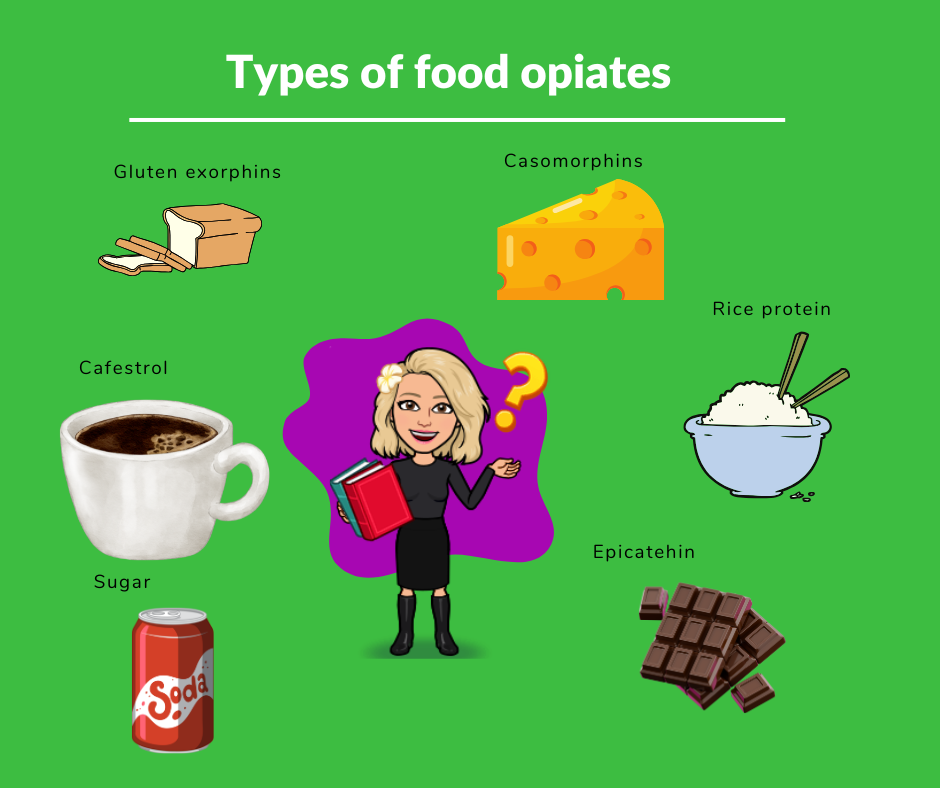Are Food Opiates Causing Your Food Addictions
- Vicki Witt
- Jul 25, 2025
- 3 min read
You’ll often hear people say they are addicted to certain foods. But experts have argued that these are not true addictions because they are merely psychological in nature and are not true physical addictions.

However, many foods contain opiates or increase brain levels of opiates which means that actual physical addictions may be present.
What is a food opiate?

Opiates are naturally occurring opium-like substances that are found in plants. These include opium, morphine, codeine and heroin. These are distinguished from synthetic opioids like fentanyl and oxycodone. They are most often prescribed medically for pain relief. Both synthetic opioids and natural opiates can be addictive.
What foods do these occur in?
The most well known opiate containing plant is the poppy, but several other foods contain opiates as well. Here is a summary of the different types of opiates or opiate like substances and the foods they are found in.

Gluten exorphins
Gluten containing foods contain substances called gluten exorphins which are morphine like substances. Exorphins slow gastrointestinal transit time, reduce the perception of pain and increase prolactin levels similar to highly addictive opiates. Any food containing gluten like wheat, barley, and rye will contain gluten exorphins.
Casomorphins
Casomorphins are an opiate that is formed when the milk protein casein is broken down into peptides during digestion. Casomorphins can attach to dopamine receptors causing feelings of pleasure and reward. This can lead to cravings of foods like cheese.
Cafestrol
The addictive properties of coffee may not be just from the caffeine. Cafestrol, which is found in coffee, has pain relieving effects and can activate opioid receptors.
Rice protein
When trying to eliminate gluten from their diets many people turn to rice. But the rice protein albumin can also have opioid properties.
Epicatechin
Epicatechin is found in chocolate, some berries and green tea and has several benefits including increased blood flow and cognitive function. The amount found in cocoa is enough to stimulate opioid receptors in the brain. This and the sugar content can help to explain the addictive qualities of chocolate.
Sugar
Fructose and other sugars, especially high fructose corn syrup, have been vilified for their contribution to obesity, and other diseases. Sugars do not contain opiates, but have an effect on the brain similar to other addictive substances.
Biological reasons for food addictions
It may be surprising that so many foods contain addictive substances, or generate addiction responses.
We have evolved to favour high fat and high calorie foods which often contain opiates. For hunter-gatherers, food was much harder to come by which may make these foods more favorable.
However our current diet often contains heavily processed foods that contain many of these addictive substances. This makes it harder to overcome what your brain has evolved to do.
What can you do?

Addiction to food, like other substances, is not a choice and breaking the addictive behaviour is not a case of simply having better willpower. You may need support to get your addiction under control. Here are some things that can help:
Try stress reduction methods like yoga or meditation instead of food to help you cope with stress
Reduce the amount of processed foods in your kitchen.
Replace food rewards with non food rewards.
How I can help
I can help you to determine what is causing your difficulty losing weight. Together we can come up with a plan that addresses food addictions and other areas that are making weight loss impossible. I won’t dismiss your addictions, but will support you to the highest level so you finally succeed with an eating plan that suits you, your lifestyle, is sustainable, and you love.
Warm wishes,

Vicki Witt | Clinical Nutritionist | Holistic Coach | Reiki Master | Certified LEAP allergy therapist Over 25 years of successfully helping you achieve optimal health and weight loss 🍏| www.vickiwittweightloss.com
About Vicki:
Vicki Witt is a Clinical Nutritionist, Holistic Health Coach, and Reiki Master. She has been practicing over 25 years and specializes in holistically customizing diet and lifestyle plans to each individual for weight loss and hormonal control. Her clientele often report they feel the best they have ever felt and wish they had started sooner. One of the USA and Australia's top Nutritionists, she has won multiple awards for her services in the industry.
Certified and Registered Nutritionist
.png)







Comments